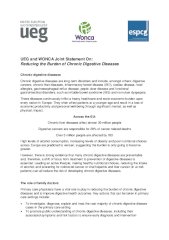
UEG and WONCA Joint Statement On: Reducing the Burden of Chronic Digestive Diseases
Chronic digestive diseases
Chronic digestive diseases are long-term disorders and include, amongst others: digestive cancers, chronic liver diseases, inflammatory bowel disease (IBD), coeliac disease, food allergies, gastroesophageal reflux disease, peptic ulcer disease and functional gastrointestinal disorders, such as irritable bowel syndrome (IBS) and non-ulcer dyspepsia.
These diseases continuously inflict a heavy healthcare and socio-economic burden upon every nation in Europe. They often affect patients at a younger age and result in a loss of economic productivity and personal well-being through significant mental, as well as physical, impact.
Across the EU:
Chronic liver diseases affect almost 30 million people
Digestive cancers are responsible for 28% of cancer related deaths
Over 3 million people are affected by IBD
High levels of alcohol consumption, increasing levels of obesity and poor nutritional choices across Europe are predicted to worsen, suggesting the burden is only going to become greater.
However, there is strong evidence that many chronic digestive diseases are preventable and, therefore, a shift of focus from treatment to prevention of digestive diseases is essential. Leading an active lifestyle, making healthy nutritional choices, reducing the intake of alcohol, and screening for colorectal cancer or viral hepatitis and liver cancer (in at-risk patients) can all reduce the risk of developing chronic digestive diseases.
The role of family doctors
Primary care physicians have a vital role to play in reducing the burden of chronic digestive diseases and to improve digestive health outcomes. Key actions that can be taken in primary care settings include:
- To investigate, diagnose, explain and treat the vast majority of chronic digestive disease cases in the primary care setting
- To promote public understanding of chronic digestive diseases, including their associated symptoms and risk factors to ensure early diagnosis and intervention
- To promote healthy and active lifestyles among patients, consisting of regular physical activity
- To provide patients with informed dietary advice and interventions, including reducing alcohol intake
- To encourage uptake and participation in organised colorectal cancer screening programmes and programmes to detect viral hepatitis and liver cancer in patients at risk
- To provide psychological, as well as physiological, support for patients and to help reduce unnecessary, but frequent, stigmatisation for patients
Reducing the burden
UEG and WONCA Europe call on family doctors to recognise and work towards excellence in the prevention, as well as treatment, of chronic digestive diseases. Together, we have the opportunity to strengthen our medical community and improve public health across Europe to ensure the lifelong wellbeing of all citizens.
May, 2019
www.ueg.eu
www.woncaeurope.org
This statement has been endorsed by the European Society of Primary Care Gastroenterology (ESPCG): www.espcg.eu
- Access
- Public
- Year
- 2019
